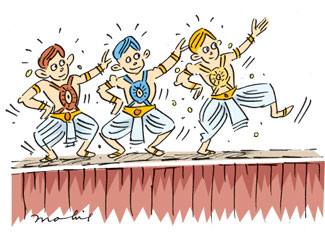|

by R. S. Karunaratne
Shades of meaning
Most English verbs have different shades of meaning. Today let's
focus our attention on a certain verb commonly used in speech and
writing.
Feel
When 'feel' is followed by an adjective it indicates the emotions of
somebody or his physical or mental condition.
I feel angry when people try to cheat me.

Don't you feel the house is
haunted?
|
She felt very happy when everybody started praising her.
Nonis felt sad when he saw the injured dog.
We feel hot these days.
Do you feel cold inside this room?
The students felt relaxed when their examination was over.
I felt nervous when the teacher asked me to address the meeting.
If you feel confident at the interview, everything will be ok.
'Feel' is usually used in the simple present tense. However, it can
also be used in the present continuous or progressive tense.
A: How are you feeling ?
B: I am feeling better now.
'Feel' can be used in the sense of 'touch' (in order to learn
something.)
When you go to the doctor he will feel your pulse.
Mother gently felt the softness of the baby's hands.
'Feel for' means 'try to find something by touching'.
Are you still feeling for for the keyhole?
'Feel for' can also mean 'to experience sympathy and sadness for
someone because they are suffering'.

Do you feel cold inside this
room?
|
I can understand what it is to live without money, so I feel for poor
people.
We do not use 'feel' in the continuous tense when it means 'sense'.
Don't you feel the house is haunted?
'Feel' sometimes means 'think'.
I feel you are right.
Don't you feel we can't compete with them?
Sometimes, we use 'feel' as a link verb.
The breeze feels cool.
'Feel like' means 'to have a wish for something'.
I feel like applying for the post of storekeeper.
I feel like having an ice-cream.
I don't feel like going to the gym.
'Feel free' means you can do it, if you like.
Feel free to ask questions after the lecture.
More next week
Know your idioms
Idioms are a colourful aspect of English. They are used both in
formal and informal English. The following quiz will help you to
understand the meaning of some commonly used idioms. Check your answers
with the key.
1. I went to see her grandfather and he was alive and kicking.
(a) full of energy
(b) dead
(c) suffering from fever
2. Despite criticism, jazz music is alive and well.
(a) unpopular
(b) popular
(c) outdated
3. Don't sit over there - the place is alive with deadly creatures.
(a) devoid of
(b) noted for
(c) covered with
4. Some people have an all or nothing approach to friendship.
(a) sacred
(b) completely or not at all
(c) dubious
5. There were 200 people at the meeting, all told.
(a) in total
(b) about
(c) approximately
6. I find your books and clothes are all over the shop! (Informal)
(a) scattered in different place
(b) neatly arranged
(c) dirty
7.Students found their former teacher not quite all there.
(a) very feeble
(b) absent minded
(c) slightly crazy
8. Mobile phones are very well, but what about their radiation?
(a) excellent
(b) both good and bad in some ways
(c) useful
9. The opposition is going all out to make their party a success.
(a) making all efforts
(b) picketing
(c) committed
10. The job was right up my alley because I was a trained nurse.
(Informal)
(a) offered to me
(b) close to my house
(c) exactly the type of think I know about
11. If you are an all rounder, many people will need your ser
vices.
(a) good at many different things
(b) a good cricketer
(c) a popular person
12. When I visited my alma mater after retirement, I did not
meet anyone known to me.
(a) grandmother
(b) the university where I studied
(c) hometown
13. The company decided to go it alone rather than set up a joint
venture with an Indian partner.
(a) expand
(b) close down
(c) do something by itself
14. Some private bus drivers are amber gamblers. (Informal)
(a) fast drivers
(b) careful drivers
(c) efficient drivers
15. A comfortable and cheap cab service was the answer to our
prayers.
(a) something we never asked for
(b) something we needed
(c) something redundant.
Key:1-a,2-b,3-c,4-b,5-a,6-a,7-c,
8-b,9-a,10-c,11-a,12-b,13-c,
14-a,15-b
Starters :
The simple past tense
The simple past tense in regular verbs is formed by adding -ed to
the infinitive.
He worked from dawn to dusk.
We danced on the stage.
She liked the new dress.
Shanthi promised to return my book.
Alwis thanked me for giving him driving lessons.
Verbs ending in e add d only. See above examples: danced, liked,
promised.

We danced on the stage
|
We loved to sit on the beach.
There are no inflexions, ie, the same form is used for all persons.
I worked (First person singular)
You worked (Second person singular)
He worked (Third person singular)
We worked (First person plural)
You worked (Second person plural)
They worked (Third person plural)
If the final consonant of a verb is preceded before adding -ed.
We stopped on the way to Kataragama.
The child was admitted to a national school.
The pilgrims travelled from Jaffna to Anuradhapura.
Verbs ending in y following a consonant change the y to i
before adding -ed.
Carry: They carried the babies in their arms.
Obey: Children obeyed their parents.
Irregular verbs vary considerably in their simple past form. Here is
a list of some of the irregular verbs with their past tense form.
Starters should make an effort to remember them.
Arise : arose
Bear : bore
Beget : begot
Bid : bade
Bind : bound
Bite : bit
Blow : blew
Break : broke
Chide : chid
Choose : chose
Cleave : clove
Draw : drew
Drink : drank
Drive : drove
Fall : fell
Forget : forgot
Fly : flew
Forsake : forsook
Freeze : froze
Get : got
Grow : grew etc.
We use the simple past tense for many kinds of past events.
Sita broke a plate last night.
Namasiri spent all his money to buy books.
The king decided to make him a minister.
I saw a bird perched on the branch of a Sal tree.
The simple past tense is used for a past action when the time is
given.
Louis Pasteur died in 1895.
I met Balasingham yesterday.
Sometimes, the simple past tense is used for an action of which the
time is not given.
Dayasena worked in a bank for ten years.
Joe lived in London for a long time.
We use the simple past tense to indicate a past habit.
My father carried an umbrella wherever he went.
They never smoked.
Next: The past continuous tense.
|

